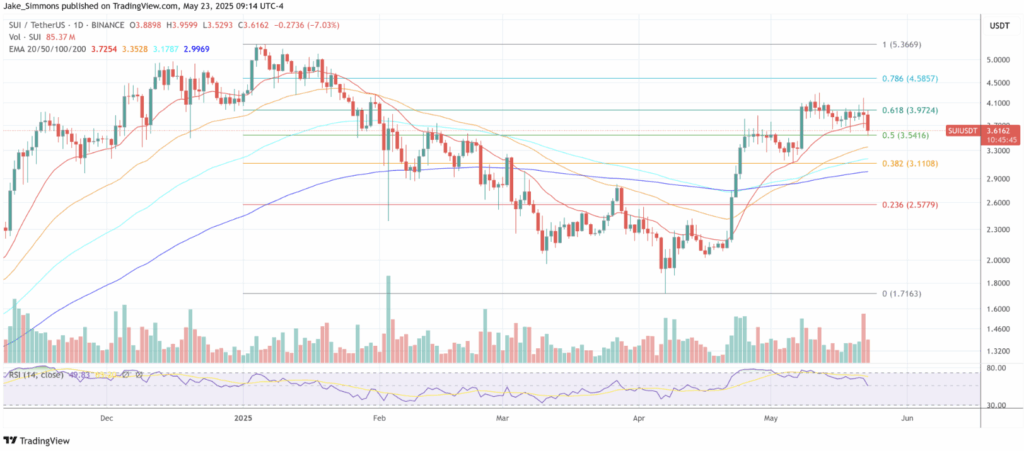- Cetus Protocol Hack: An attacker stole around $223 million from Sui-based Cetus Protocol. About $162M was frozen with help from validators, sparking debate over decentralization on Sui.
- Validator Controversy: Critics like Justin Bons argue the ability to censor transactions proves centralized control, especially with 84% of staked supply held by insiders. Sui Foundation counters it was a rare, consensus-driven emergency move.
- Community Reaction: Ethereum supporters and analysts criticized Sui’s structure, calling it too centralized, while Sui insiders defended the move as necessary for user safety. The network now faces questions on whether such actions become standard protocol.
Well, things just got messy on Sui. Cetus Protocol, a key DeFi player on the network, dropped a bomb on X — confirming that an attacker made off with a jaw-dropping $223 million from its liquidity pools. The team claimed they acted fast, locking contracts and freezing roughly $162 million of the compromised funds. They’re now working closely with the Sui Foundation and other ecosystem folks on how to handle the aftermath, promising a full incident breakdown soon.
A Freeze Sparks a Firestorm
What came next lit a fuse across the crypto community. In a rare move, a supermajority of Sui validators agreed to block transactions from three wallet addresses tied to the hacker. To some, this was heroic. To others? Proof that Sui isn’t as decentralized as advertised.
Crypto pundit Justin Bons didn’t hold back. “SUI’s validators are colluding to CENSOR the hacker’s TXs right now!” he wrote. For him, the fact that only 114 validators exist — and most of the staked tokens are controlled by insiders — means centralization is baked into the system.
But not everyone saw it that way.

Governance or Collusion?
Amogh Gupta from the Sui Foundation pushed back hard, arguing that reaching consensus isn’t the same as collusion. “Validators on other chains have done the same. Remember Ethereum blocking OFAC-sanctioned addresses in 2023?” he asked. Gupta pointed out that in Sui’s case, the consensus was clear and the motive — halting a hack — wasn’t up for debate.
Bons disagreed. “No ETH transaction was censored in 2023. You’re misinformed.” He said Sui’s token economics are the real red flag: with over 8 billion SUI staked and 84% of that held by insiders, consensus isn’t just possible — it’s practically guaranteed. “That’s not decentralization. That’s control,” he fired back.
Gupta argued that counting validators doesn’t mean much. It’s the Nakamoto Coefficient (NC) — the number of nodes needed to halt the network — that really matters. “1,000 validators mean nothing if one controls more than a third of the stake,” he said. Bons, unfazed, snapped back: “You’re really defending founders holding 80%+ of the stake? That’s wild.”
Ethereum Stans Join the Fray
The debate went way beyond the Sui camp. Ethereum loyalists chimed in, calling Sui’s intervention a death knell for its decentralization claims. “Only Ethereum is built to secure the world’s economy,” wrote @fabdarice. Crypto lawyer Gabriel Shapiro added, “Every smart-contract chain other than Ethereum is basically just an enterprise blockchain.”
Crypto personality Sssebi summed it up bluntly: “Looks like SUI shot themselves in the foot.”
Is This a Safety Feature or a Slippery Slope?
Defenders of Sui say this isn’t a power grab — it’s an “emergency brake” for extreme situations. Nefarii.sui, founder of SuiMoveAfrica, explained, “Validators can coordinate to freeze malicious addresses, but it’s rare and requires broad consensus. This isn’t automatic. It’s not centralized.” His takeaway? “Sui is still decentralized. This was a safety measure, not a system flaw.”
Where Do Things Stand Now?
At the time of writing, around $162 million of the stolen funds have been frozen. The hacker still holds about $61 million, most of which has been moved to Ethereum. Whether this emergency response becomes part of a formal playbook or remains a one-time fix? That’s the debate Sui now has to navigate — out in the open.
SUI’s price? It’s trading at $3.61 — calm for now, but the governance conversation is only just getting started.

















